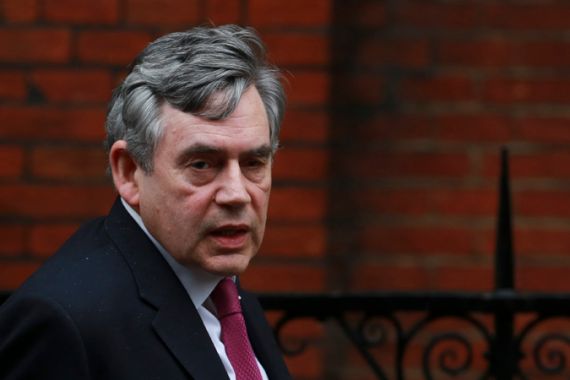Who will claim the Olympics?
Pundits are drawing lessons from the Olympic Games to suit their political and economic agendas.

London, UK – Over the last few days politicians and commentators have created a new Olympics event: the “Meaning of the Games”.
Gordon Brown has told us that the success of British athletes in London helps confirm the enduring value of the Union of England and Scotland. David Cameron has decided that it is time to end the disparagement of competition that he claims to find in the country’s state schools. More generally, the right finds in the games a series of parables about the transcendent power of individual ambition – the enterprise culture made visible and lent the charisma of sporting excellence. Meanwhile some of those who think they lean left see something else altogether: confirmation of the need for shrewd public investment to shore up national competitiveness.
The central distinction here is between the freedom-loving partisans of market forces and the advocates of an activist central state. For all the speed and agility of the athletes, the games have not been able to escape the structure demanded in our system of public speech. You can make any choice you like, as long as you choose between the freedom of the individual and big government.
This way of organising controversy and corralling sentiment has a long history. In 1968 the great critic and socialist reformer Raymond Williams noted that, in the debate about the media, “We have been reduced to making contrasts between the speculator and the bureaucrat, and wondering which is the blacker devil.”
Between two poles
Modern political competition happens largely in the space between these two poles. The United States’ Presidential elections in November, for example, will be saturated with rhetoric about Obama’s supposed statism, and about his opponents’ – especially Paul Ryan’s – supposed love for unbridled individualism.
But though the conflict is treated with deadly seriousness by almost everyone concerned, it has less in common with the contests in the Olympics themselves than it does with the tired showmanship of the closing ceremony. Though the American media will make much of the ideological differences between Democrats and Republicans, both sides are committed to low taxation and accordingly modest social provision. They are also committed to a vast military apparatus.
In the modern era the global economy has depended on state expenditure to maintain growth. In 1950 a National Security Council memorandum warned that “there are grounds for predicting that the United States and other free nations will within a few years at most experience a decline in economic activity of serious proportions unless more positive government programs are developed than are now available”.
The American state resolved to use expanded military budgets to maintain growth and prevent a return to global depression. Characteristically, the state didn’t explain what it was doing. The American public was told that they were fighting a Cold War against their erstwhile allies, China and the Soviet Union. There was no debate about whether people might prefer to spend their own money on something else. The workings of the economy, the whole apparatus for shaping and satisfying demand, remained a mystery, thanks to the eager collaboration of plutocrats and bureaucrats. It is this collaboration that continues to lie beneath the sound and fury of the electoral cycle.
Governments continue to menace us with a succession of more or less fictitious bugbears, the better to make anyone who asks questions appear recklessly irresponsible. The money is then shovelled to private contractors in an orgy of reckless irresponsibility. In 2001 the Pentagon noted that it had lost track of some $2.3tn. That is just the money that they’ve lost outright. The money spent on illegal and capricious wars brings the cost of our continuing incomprehension far higher. Capitalism, a system that is supposed to be based on sober calculation by free individuals, turns out to depend on a kind of state-sponsored insanity.
The state must change
What, then, are we to do? While outraged libertarianism is tempting, it is not a solution. There are simply too many problems that can only be addressed through collective action. We are already in the early stages of an ecological crisis that has the potential to destroy industrial civilisation. The wealth that matters is the commonwealth of a habitable planet. We need cheap energy, and lots of it. So much, in fact, that it is effectively free. It is the only way to end our horrible romance with fossil fuels. Yet no state integrated with Big Oil will put it out of business. The state, therefore, must be made to change.
Let’s assume that public investment is necessary and work back to a set of institutions that can establish and secure legitimate objectives. The choice is not between the private economy and an unaccountable state; it is between their current collusion and a wholly new distribution of knowledge and power. We can start by reforming the system of communication so that it no longer serves the cause of the higher mystifications. Then, and only then, can we discuss our shared needs and conflicting wants on the basis of a tolerably accurate understanding of the world.
Market forces and the unreformed state have shared gold and silver between them for too long. It is time democracy took its place in the political game. By the time the Olympic Games begin again in Rio, I hope we will have stopped gawping at the spectacular show put on by the bureaucrats and the plutocrats. Stopped gawping, and started running, because time is not on our side.
Dan Hind is the author of two books, The Threat to Reason and The Return of the Public. His pamphlet Common Sense: Occupation, Assembly, and the Future of Liberty, was published as an e-book in March. He is a member of the Tax Justice Network.
